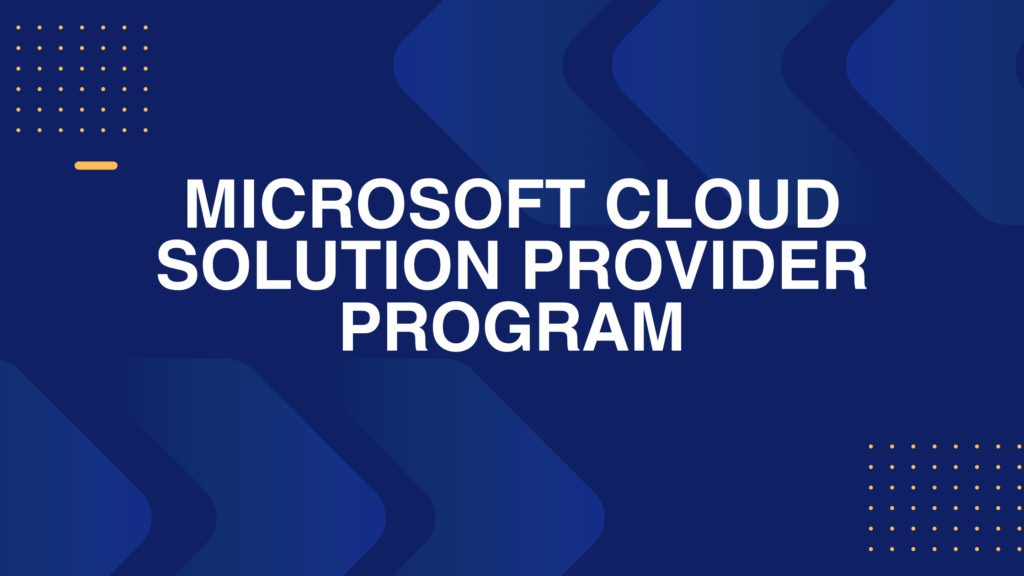The cloud is not just another tech buzzword; it’s a pivotal foundation for modern business infrastructure. Specifically, the Microsoft Cloud Solution Provider (CSP) program stands out as a strategic initiative that empowers businesses to leverage Microsoft’s comprehensive cloud services efficiently. This article delves deep into what the Microsoft Cloud Solution Provider program entails, its benefits, operational models, and much more, providing a clear pathway for businesses considering cloud adoption or optimization through Microsoft’s solutions.
What is the Microsoft Cloud Solution Provider Program?
Microsoft Cloud Solution Provider Program Explained
At its core, the Microsoft Cloud Solution Provider program is designed to facilitate closer connections between Microsoft and businesses, allowing them to sell and manage Microsoft’s cloud services like Azure, Office 365, and Dynamics 365 under a single agreement. The Microsoft Cloud Solution Provider program simplifies the cloud service procurement and management process. It enhances customer engagement by providing businesses the tools they need to manage the entire customer lifecycle from billing to support.
Benefits of Enrolling in the Microsoft Cloud Solution Provider Program
Joining the Microsoft Cloud Solution Provider (CSP) program offers significant advantages that can elevate a business’s operations, customer service, and revenue streams. Below, we explore these benefits succinctly, aligning with the program’s capabilities to meet modern business demands efficiently.
Enhanced Customer Engagement
Regular interactions facilitated by Microsoft CSP tools help businesses understand and address customer needs effectively. This direct engagement boosts satisfaction and cultivates loyalty, enhancing customer retention rates.
Increased Revenue Opportunities
The Microsoft Cloud Solution Provider program enables businesses to expand their service offerings, such as managed services, which can tap into new customer bases and generate additional revenue. This approach not only increases sales but also diversifies income sources.
Customized Solutions
With the Microsoft Cloud Solution Provider program, businesses can tailor their cloud services to meet specific industry needs, providing clients with customized solutions that perfectly align with their operational requirements. This customization capability allows firms to stand out in their market, offering targeted solutions that competitors may not provide.
Operational Efficiency and Cost Savings
Microsoft Cloud solutions streamline operations through automatic updates and scalable resources, reducing downtime and maintenance costs. This operational efficiency ensures that businesses can focus more on strategic tasks rather than routine maintenance.
Flexibility and Scalability
The Microsoft Cloud Solution Provider program allows businesses to easily scale their IT infrastructure up or down as needed without significant upfront investments. This flexibility is crucial for adapting to changing market conditions and customer demands.
Robust Security and Compliance
Microsoft ensures that its cloud solutions adhere to the latest industry standards for security and compliance, offering businesses peace of mind when it comes to protecting sensitive data and meeting regulatory requirements.
Understanding CSP Models: Direct and Indirect
Choosing the right Microsoft Cloud Solution Provider (CSP) model is crucial for aligning your business strategy with your capabilities and market goals. Below, we detail the two primary models within the Microsoft Cloud Solution Provider program: the Direct-Bill Model and the Indirect Model, using non-plagiarized content that incorporates essential keywords to enhance SEO effectiveness.
Direct-Bill Model
The Direct-Bill Model is tailored for large-scale providers that can handle comprehensive in-house sales, billing, and customer support operations. This model is particularly suitable for businesses that have:
- Robust Infrastructure: Necessary for end-to-end billing and customer support, ensuring that all customer interactions and transactions are managed efficiently and effectively.
- Revenue Thresholds: Participants must meet certain annual revenue criteria from selling Microsoft cloud solutions, proving their capability and success in the marketplace.
- Compliance with Microsoft’s Standards: Adherence to Microsoft’s partner agreement and support plans is essential, ensuring that all operations are up to Microsoft’s standards for security and service.
This model involves purchasing SKUs directly from Microsoft and reselling them to customers, allowing providers to maintain a high level of control over pricing and customer relationships. However, it requires significant resources and infrastructure, as well as compliance with strict Microsoft guidelines.
Indirect Model
The Indirect Model is ideal for businesses that prefer to focus on their core offerings while leaving the complexities of support and billing to a seasoned distributor. This model is favored due to its:
- Access to Experienced Providers: Partners gain access to a broad network of experienced providers who can offer substantial support and guidance.
- Reduced Operational Complexity: By outsourcing support and billing tasks, businesses can simplify their operations and reduce the overhead associated with these functions.
- Scalability: The indirect model supports scaling business efforts without massive upfront investments, providing flexibility to grow at a pace that matches business demand.
In this model, CSP partners buy their SKUs from a distributor rather than directly from Microsoft, which significantly lowers the entry barriers and operational demands. Partners benefit from the distributor’s infrastructure and expertise, allowing them to focus on enhancing their product offerings and accelerating their market presence.
Choosing the Right Microsoft Cloud Solution Provider Model for Your Business
Selecting the right Microsoft Cloud Solution Provider model hinges on your business size, expertise, and market goals. For newcomers with limited resources, the indirect model may be more appropriate, while large enterprises with the capacity to manage direct customer relationships might prefer the direct-bill model.
Why Your Business Should Embrace Microsoft Cloud Solutions
Leveraging Microsoft Cloud solutions, such as Microsoft Azure, provides a host of benefits that are essential for businesses looking to optimize their operations and enhance their technological infrastructure. Here’s why adopting Microsoft Cloud Solutions is a strategic move for your business:
Seamless Integration with Microsoft Ecosystem
Microsoft Azure flawlessly integrates with a variety of Microsoft tools, enhancing efficiency and productivity. Whether it’s Outlook, Office 365, or SharePoint, Azure supports the same virtual machines (VMs) that on-premise systems use, including both Windows and Linux. This seamless integration ensures that businesses can easily adopt Azure without disrupting existing workflows.
Partnership with a Trusted Industry Leader
By adopting Microsoft Azure Cloud Services, your business aligns itself with a globally recognized leader in technology. Microsoft’s robust reputation, built on reliability and trust, underscores its appeal to many Fortune 500 companies. Utilizing widely acclaimed tools such as Microsoft Teams, SharePoint, Bing, and Dynamics 365, Azure empowers businesses with reliable and scalable cloud services.
Customizable Cloud Solutions
Azure’s flexibility as both Infrastructure as a Service (IaaS) and Platform as a Service (PaaS) allows businesses to tailor their cloud environment to their specific needs. With Azure IaaS, you pay only for the services you use, which optimizes costs while providing the flexibility to scale up or down based on your requirements. Similarly, Azure PaaS enables the development of applications and software without the need to invest in and manage the underlying infrastructure.
Advanced Support for Open-Source Analytics
The Azure cloud platform excels in supporting open-source analytics, offering managed SQL and NoSQL data services with robust support frameworks. This capability facilitates profound data analysis, allowing businesses to garner insightful, data-driven intelligence that can transform business processes and decision-making. Azure also provides access to high-definition insights and powerful data analytics tools that enhance the ability to draw meaningful conclusions from complex datasets.
Continuous Innovation and Updates
Microsoft Azure is continually evolving, with regular updates that introduce new functionalities and enhance existing services. These updates are designed to improve user experience and add value, ensuring that businesses have access to the most advanced and efficient cloud computing technologies available. This continual improvement cycle helps companies stay competitive in a fast-paced market by leveraging cutting-edge cloud capabilities.
Microsoft Cloud Solutions for Modern Businesses
Microsoft offers a comprehensive suite of cloud solutions that cater to various business needs, enhancing productivity, security, and scalability. Here are some key Microsoft Cloud Solutions that are indispensable for any modern enterprise:
Microsoft Azure: A Comprehensive Cloud Platform
Microsoft Azure stands out as a versatile cloud platform, providing Software as a Service (SaaS), Infrastructure as a Service (IaaS), and Platform as a Service (PaaS) options. This flexibility allows businesses of all sizes to deploy and scale applications, data storage, and core business processes without the heavy upfront costs typically associated with such technology. Azure supports private, public, and hybrid cloud environments, offering tailored solutions that help businesses manage their operations efficiently and scale dynamically in response to their needs.
Microsoft Office 365: Enhancing Productivity Anywhere
Microsoft has transformed productivity by migrating Office solutions to the cloud with Office 365. This move allows users to access essential tools like Word, PowerPoint, Excel, OneNote, Outlook, Access, Publisher, Lync, and InfoPath from anywhere, promoting a flexible work environment. Especially useful in this suite is Microsoft Teams, which integrates deeply with other Office apps to provide a unified platform for seamless communication and collaboration across organizational boundaries.
Microsoft Windows Intune: Streamlined Device Management
Windows Intune is a robust cloud-based mobile management service that simplifies the administration of devices connected across enterprises. Compatible with Windows, iOS, and Android systems, Intune integrates with Microsoft System Center, enabling centralized management of both mobile devices and PCs. This solution is ideal for maintaining corporate security and ensuring that all devices comply with the company’s IT policies.
SQL Server with Microsoft System Center: Secure and Scalable Databases
Microsoft SQL Server has gained significant traction since its inception, thanks to its capability to operate within the cloud through integration with Microsoft System Center Virtual Machine Manager. This setup allows businesses to leverage the advantages of a private cloud—such as enhanced data security and privacy—while enjoying the flexibility and scalability of cloud-based resources. SQL Server in the cloud ensures that enterprises can manage large databases efficiently and securely.
Microsoft Visual Studio: Empowering Developers in the Cloud
Microsoft Visual Studio is tailored for developers who need to manage their codebase, collaborate on projects, and build applications efficiently. With features that support the development of multi-device hybrid apps using standard web technologies and Apache Cordova, Visual Studio on the cloud allows developers to write, debug, and deploy applications that can operate across Windows, iOS, and Android platforms. Enhanced by Application Lifecycle Management (ALM) capabilities, Visual Studio enables developers to maintain and streamline project architecture effectively.
Each of these Microsoft Cloud Solutions plays a crucial role in empowering businesses to operate more dynamically and adapt to the evolving technological landscape. By integrating these tools, companies can ensure optimal performance, enhance security, and foster a collaborative work environment conducive to innovation and growth.
Next Steps: Implementing CSP Solutions in Your Business
Implementation Roadmap
- Assess your business needs and capabilities.
- Choose between the direct or indirect CSP models based on your assessment.
- Plan and execute the integration of CSP solutions into your business processes.
- Continuously evaluate and adapt to new cloud innovations and customer feedback.
Conclusion
The Microsoft Cloud Solution Provider program is more than just a pathway to adopting cloud technology; it is a strategic partner that enhances every aspect of business operations from collaboration and customer engagement to operational efficiency and innovation. By deeply understanding the program’s offerings and strategically implementing its solutions, businesses can achieve significant growth and efficiency, positioning themselves as leaders in their respective industries.
At TotalOne, we excel in understanding and aligning with your business needs for transitioning to cloud technologies. We carefully evaluate your requirements to recommend and implement the most suitable Microsoft Cloud solutions for your enterprise.
With extensive experience in diverse cloud computing scenarios, our team ensures clear, effective processes and smooth execution. Our Microsoft cloud consultants, knowledgeable across various industries, are ready to guide you in leveraging the unique opportunities available in cloud technology.
Feel free to contact us for a detailed discussion about how we can tailor our cloud solutions to your needs. At TotalOne, we’re eager to help you navigate the cloud era and transform your business operations.
FAQ
What is the Microsoft Cloud Solution Provider Program?
The Microsoft Cloud Solution Provider Program is a comprehensive initiative designed to enable businesses to sell, manage, and deploy Microsoft’s leading cloud services, such as Azure, Office 365, and Dynamics 365, through a single streamlined platform.
What are the different models available within the Microsoft Cloud Solution Provider program?
The program offers two primary models: the Direct-Bill Model, suitable for large providers with the capability to manage end-to-end sales, billing, and customer support; and the Indirect Model, ideal for businesses that prefer to leverage the expertise and infrastructure of experienced providers for support and billing tasks.
Can I customize cloud services under the Microsoft Cloud Solution Provider program to fit my business needs?
Yes, the Microsoft Cloud Solution Provider program allows businesses to tailor their cloud services to meet specific industry requirements and customer needs, providing a highly personalized approach to cloud solutions.
What does the Direct-Bill Model in the Microsoft Cloud Solution Provider program entail?
The Direct-Bill Model involves purchasing SKUs directly from Microsoft and managing all aspects of customer interaction and billing, offering a high level of control over pricing and customer relationships. It requires a robust infrastructure and compliance with Microsoft’s stringent standards.
How does the Indirect Model of the Microsoft Cloud Solution Provider program work?
In the Indirect Model, businesses purchase their SKUs through a distributor instead of directly from Microsoft. This model reduces operational complexity and allows companies to benefit from the expertise and infrastructure of the distributor, simplifying the sales and support process.
What steps should I take to implement Microsoft Cloud Solution solutions in my business?
To effectively implement solutions from the Microsoft Cloud Solution Provider program, assess your business needs, choose the appropriate CSP model, integrate the chosen solutions into your business processes, and continually adapt to new cloud innovations and customer feedback.
How can TotalOne assist my business in implementing CSP solutions and what are the benefits?
TotalOne specializes in facilitating the seamless integration of Microsoft Cloud Solution Provider solutions into businesses of all sizes. Our approach involves a detailed assessment of your specific needs to ensure the CSP solutions we recommend align perfectly with your business objectives. By partnering with TotalOne, you gain access to expert guidance, tailored cloud solutions, and continuous support, all of which are designed to enhance your operational efficiency, scalability, and market competitiveness. This strategic partnership not only simplifies your transition to cloud-based services but also maximizes your investment in Microsoft’s cutting-edge cloud technologies.



